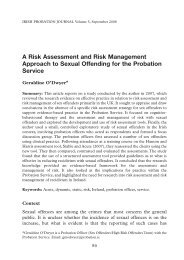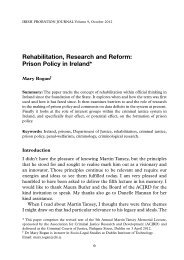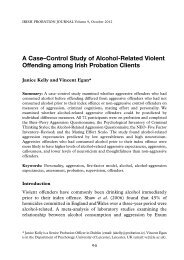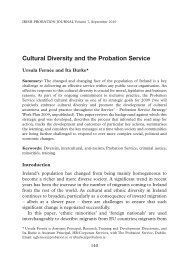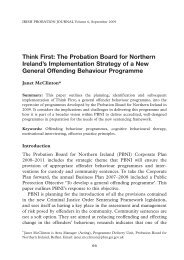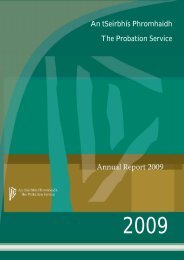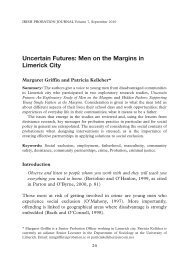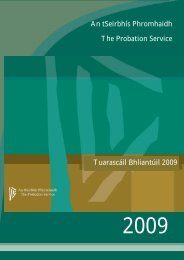Perceptions Of Restorative Justice In Ireland - The Probation Service
Perceptions Of Restorative Justice In Ireland - The Probation Service
Perceptions Of Restorative Justice In Ireland - The Probation Service
You also want an ePaper? Increase the reach of your titles
YUMPU automatically turns print PDFs into web optimized ePapers that Google loves.
<strong>Perceptions</strong> of <strong>Restorative</strong> <strong>Justice</strong> in <strong>Ireland</strong> 197<br />
an RJ process, successfully implemented, can reduce trial costs and lead<br />
to a need for fewer expensive prison places. Benefits include not only<br />
saving in criminal justice resources needed to arrest, prosecute, defend,<br />
convict and imprison or otherwise sanction the offender, but also the<br />
absence of injury and harm to victims and the community.<br />
One factor meriting attention in considering value for money is that if<br />
RJ is deemed appropriate only for minor offences, then it is unlikely to<br />
produce a significant cost saving in, for example, prison accommodation.<br />
Less serious offenders are unlikely to be committed to custody in most<br />
cases. Use of significant resources in processing a less serious case<br />
through RJ could be seen as uneconomical where such cases could be<br />
more economically dealt with through fines, compensation orders, etc. <strong>In</strong><br />
such cases what would be lost is the impact of the RJ process.<br />
<strong>Restorative</strong> justice is not formally established in Court practice in<br />
<strong>Ireland</strong> except in the Nenagh and Tallaght catchment areas.<br />
Nevertheless, versions of RJ practice are, informally, a feature of daily life<br />
in the Irish Courts. For example, in my experience one of the deciding<br />
factors considered by Judges in sentencing is whether or not the offender<br />
has compensated the victim for any loss suffered. Judges enquire as to<br />
whether or not an apology has been offered for the offending behaviour.<br />
<strong>The</strong> timing of the apology can have a significant bearing on sentencing,<br />
with close scrutiny given to whether the apology was offered before the<br />
issuing of the summons and whether it was done on legal advice to lessen<br />
the likelihood of a custodial sentence. Such ad hoc and informal ‘RJ’, in<br />
my view, makes the implementation of a transparent and comprehensive<br />
RJ system on a nationwide basis more necessary, but also a more<br />
complex challenge to implement.<br />
Without legislation, it is not easy for practitioners to advise clients<br />
whether a restorative-type programme is appropriate or exceeding the<br />
Court’s authority. Consistency is difficult to ensure if a scheme is<br />
operated on an ad hoc basis by individual Judges without structure. If a<br />
judicial process has neither clear authority nor consistency in application,<br />
independent overview is impossible and problems inevitably arise.<br />
<strong>The</strong>re is a need, in such circumstances, for legislation and guidelines.<br />
<strong>The</strong> establishment of local RJ programmes without supporting<br />
legislation can create problems of consistency and equity, as the same<br />
options are not available in other Courts in neighbouring areas. It may<br />
feed doubts over the authority and status of ‘free-standing’ initiatives and<br />
schemes.



